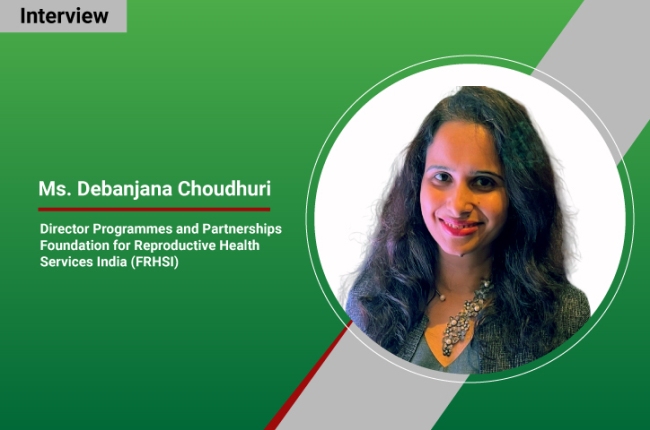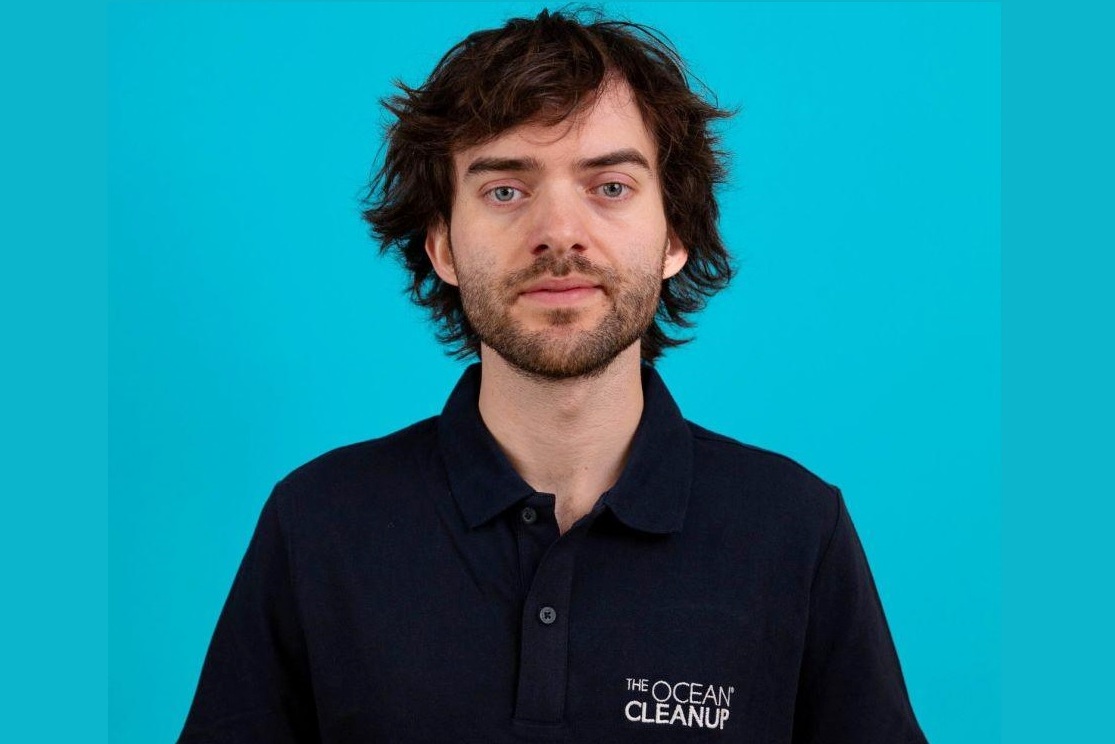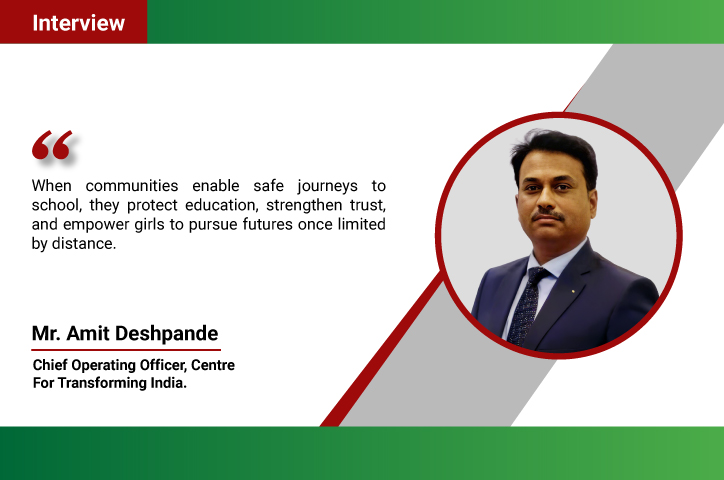In India, the state of female reproductive health has been a topic of growing concern and significance. The country grapples with various challenges related to women's reproductive well-being, including limited access to healthcare resources, inadequate education about reproductive health, and persistent socio-cultural stigmas. Despite substantial progress over the years, maternal mortality rates, teen pregnancies, and instances of unsafe abortions remain critical issues. In light of these challenges, this interview sheds light on the efforts and initiatives undertaken by organizations dedicated to addressing these pressing concerns.
In this interview, TheCSRUniverse is in conversation with Ms. Debanjana Choudhuri, Director Programmes and Partnerships Foundation for Reproductive Health Services India (FRHSI), who is committed to improving the reproductive health of women in India. Debanjana has dedicated her career to advocating for women's health rights, conducting research, and providing crucial support to countless women across the country. In this interview, she shares her insights, experiences, and the pivotal role her organization plays in advancing female reproductive health in India. Join us as we explore the challenges and opportunities in this critical aspect of women's well-being.
Scroll down to read the full interview:
Q. What are the key principles guiding FRHSI mission in advancing reproductive health and rights?
A. We at Foundation for Reproductive Health Services (FRHS) India are mission-driven to ensure everyone is supported to make decisions about their bodies and their futures. We believe that women should have the right to choose whether, when and how many children to have. We aim to meet the 2030 SDG goals of ensuring universal access to sexual and reproductive health-care services, including for family planning, and the integration of reproductive health into national strategies and programmes.
Q. Can you elaborate on the programs and advocacy efforts that FRHSI undertakes to empower individuals regarding their reproductive health? Can you share any specific success stories or examples of how FRHSI initiatives have positively impacted women's access to safe abortion services or reproductive health in India?
A. At FRHS India we work by prioritising client-centeredness. To enable our clients to exercise their sexual and reproductive rights and choices, our program implementation is bilateral: service delivery, policy, and advocacy. We are providing services in 5 States, spanning over 74 Districts with service delivery channels of Public Sector Facilities, Clinical Outreach Teams (COT), Mini-Clinical Outreach Teams and Clinics.Our service delivery teams provide information and counselling on a range of modern family planning methods, to enable our clients to choose a method that suits them the best. We provide a range of contraceptive choices and comprehensive abortion care at our clinics and through our outreach teams.We have been delivering healthcare services with resilience and have positively impacted society’s access to SRHR in India. The success storiescan be viewed below:
https://www.frhsi.org.in/stories-of-changes.php
Q. What steps is FRHSI taking to ensure access to safe and affordable healthcare services in the realm of reproductive health?
A. We aim to empower individuals and families to make healthy choices through improved access to information and high quality, affordable sexual and reproductive health services. We have pioneered a 9-step approach to ensure quality service delivery for the outreach. These steps include:
Registration | Counselling | Laboratory Tests
PV Examination | Pre-procedure Examination
Pre-procedure Medication | Procedure
Post-operative Care | Discharge
Q. How does FRHSI emphasize its commitment to safe and legal abortion services? Additionally, what are the advantages of medical abortion compared to surgical abortion, and why is it not widely available in India?
A. About 5% of the estimated 15.6 million abortions in India are estimated to be unsafe, despite a liberal Medical Termination of Pregnancy Act which allows abortion up to 20 weeks’ gestation. Women are unable to access safe abortions in India due to several reasons including a lack of awareness on the legality of abortion, social stigma, and a low number of registered MTP providers offering MTP services. Our clinics provide both surgical and medical methods of abortion. In addition, we provide post-abortion contraceptive services too.
Q. How does the recent decision by Mexico's Supreme Court impact the global fight for women's rights, including access to safe abortion services?
A. On September 7, a landmark decision by Mexico’s Supreme Court found that laws prohibiting abortion were unconstitutional violations of women’s rights. The decision lays the foundation for the full decriminalisation of abortion in Mexico but will have to be enacted in the legislature before it will be the law of the land.The judgement opens the door for the federal healthcare system to provide abortions. It has been welcomed by women's rights groups.The Mexican court ruling had the potential to set an important example in the region if there is a political will to ensure access to abortion is ensured at the ground level.
Q. What are the existing challenges in India regarding access to safe and legal abortion services?
There are several barriers to accessing safe and legal abortion services because of:
- Lack of awareness of legal provisions and confused interpretation of the law.
- The situation is further complicated for adolescents when they seek abortion services. The Child Marriage Act and the taboo around premarital sex further only make it difficult for adolescents, illegally married and unmarried, to access safe abortion services.
- The social stigma surrounding abortion persists including amongst abortion providers and implementing authorities, preventing individuals from seeking safe services and often forcing them into unsafe practices. Healthcare infrastructure, especially in rural areas, remains inadequate, limiting access to safe abortion facilities.
- The amendment of the MTP Act, 2021 still has loopholes, where the final call is in the hands of the medical practitioners.
Q. Can you explain the role FRHSI plays in increasing awareness about safe abortion and addressing the stigma associated with it? How does FRHSI advocate for the removal of barriers to medical abortion and improved access to contraception?
A. Between 2013 to 2022, FRHS India has provided family planning and safe abortion services to over 1,852,056 women and men. FRHS India hosts the Pratigya Campaign, working towards protecting and advancing women’s rights and their access to safe abortion care in India.The campaign reviews existing media guidance available on abortion; adapts it where required; translates it into the local language and disseminates it widely. The Campaign seeks to facilitate engagement with media on sexual and reproductive rights and ensure that abortion issues find a place in media discourse regularly.
Q. What are the main challenges FRHSI faces in its efforts to advance reproductive health and rights in India? How does FRHSI plan to tackle these challenges?
Significant challenges persist in India’s reproductive health services despite of notable improvements in recent years.
- Rural regions continue to face barriers like inadequate infrastructure, limited healthcare facilities, social stigma,and limited access to non-judgemental services.
- Socio-economic disparities impact accessibility, with marginalised communities facing more obstacles.
- Healthcare infrastructure, trained personnel, and affordable services require substantial investment to ensure equitable access nationwide.
- The social stigma surrounding abortion persists, preventing individuals from seeking safe services and often forcing them into unsafe practices.
- Existence of language that sensitises and stigmatises AYSRHR.
- Struggles still exist in accessing adolescent SRHR service despite legalisation.
FRHS India is taking varied steps to tackle the challenges:
- We areconducting comprehensive awareness meetings with frontline workersto bust their myths and raise their awareness. 13,299 frontline workers have been oriented on the MTP (Amendment) Act and AYSRHR.
- We are focusing on male engagement in FP services. In Bihar, FRHS India’s NSV mobilisation has been a success over the past years and in 2022, our team inspired over 953 men to opt for vasectomy, which is a major pillar in family planning.
- We have set up a Pan India call centre in Jaipur for fostering private and safe conversations, where we have received 492 calls for guidance and non-judgemental counselling.
- We are highlighting the importance of young people playing the role of peer educators which is pivotal in disseminating information and facilitating discussions among adolescents. We have formed 2 peer educator groups.
- We are liaising with Chief Medical Health Officer (CMHO)/ Medical Officer in Charge (MOIC)/Front Line Workers (FLW) for assistance in getting permissions and usage of their platforms (block & sector meetings) for awareness generation.
Q. What can the government, local communities and other social sector stakeholders at large do to facilitate FRHSI objectives and promote reproductive health and rights in India?
A. There is a need for collaboration between government agencies, healthcare providers, and local communities to promote reproductive health and rights in India and empower individuals to make informed SRHR decisions.
- Social accountability efforts have grappled with key questions about how to make sure that duty-bearers respond. Grounding programs in public administration or legal processes can provide institutional traction; this may be particularly helpful in the case of stigmatised issues or populations that may not be easily accorded priority.
- Intentional inclusivity by creating distinct roles and groups for marginalised populations.The existing research suggests that social accountability programs could be more rights-based by ensuring that each component of the program, such as information gathering, mobilisation, and engagement, takes explicit steps to support the participation of excluded groups like adolescents and youth.
- Social sector stakeholders must support government flagship initiatives to improve young people’s access to information and services related to their health and well-being.
- Government policies and programmes should focus on addressing socio-economic disparities that hinder access to reproductive health services.
Q. How does FRHSI envision the future of reproductive health and rights in the country? Are there specific initiatives or campaigns FRHSI plans to undertake in the near future to further its mission?
A. FRHS India envisions that no abortion will be unsafe and every individual who wants access to contraception will have it by 2030. Our 2030 strategy commits us to be a better partner, while confronting the challenge with courage and resilience, and to closing the gap so that everyone is only one contact away from a safe provider.We believe it is time to shift towards embracing a choice-based approach when addressing issues related to reproductive health. Over the past 2 years, we have doubled our impact in clinics, which are state of the art and reach the most vulnerable communities in marginalised areas. We have recently initiated our health center in the Sagar district of Madhya Pradesh and soon shall start with another clinic in Bhopal. We are expanding our services in districts of Madhya Pradesh as a part of the future expansion plan, and we endeavour to increase our operations further.


















